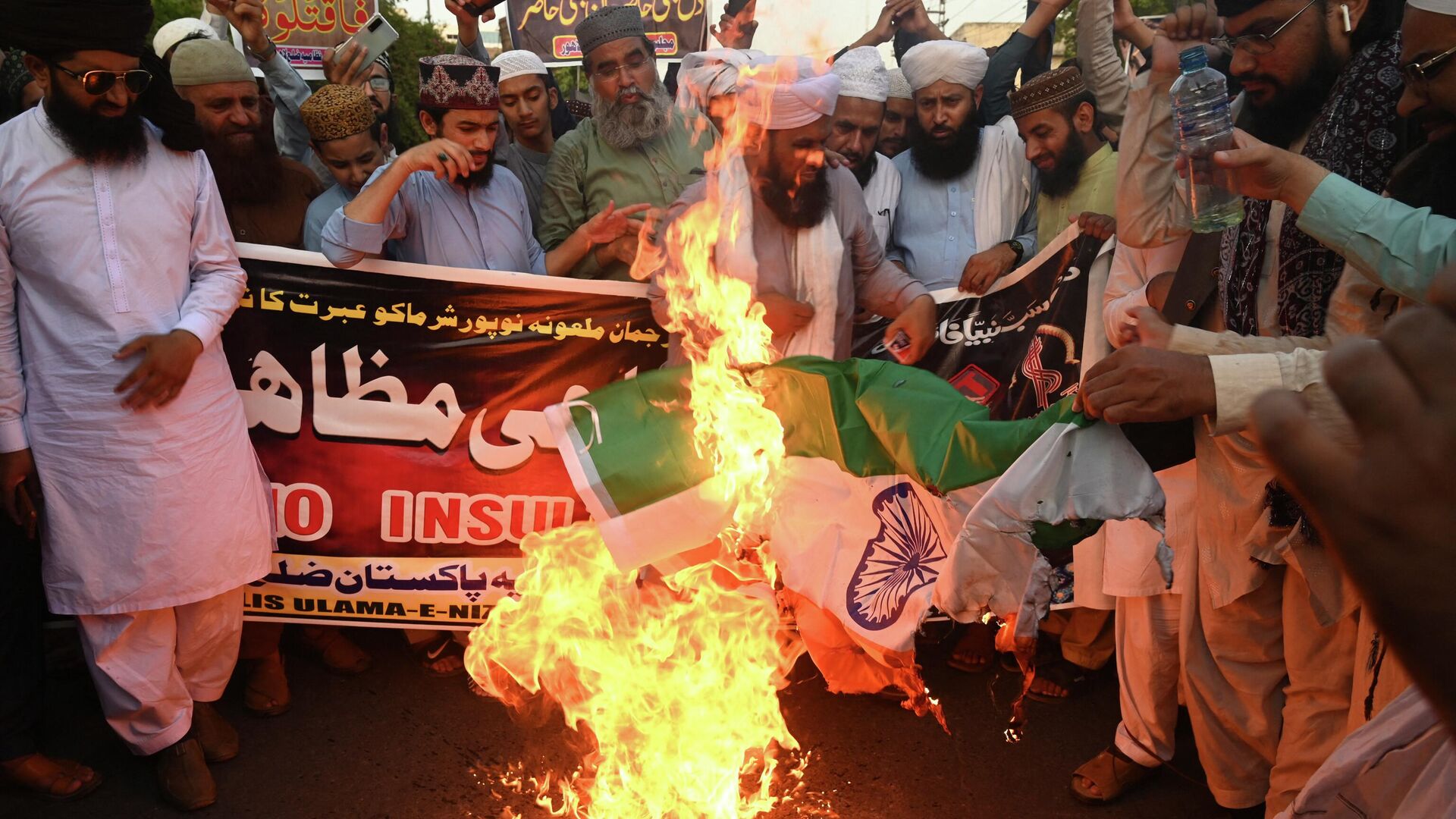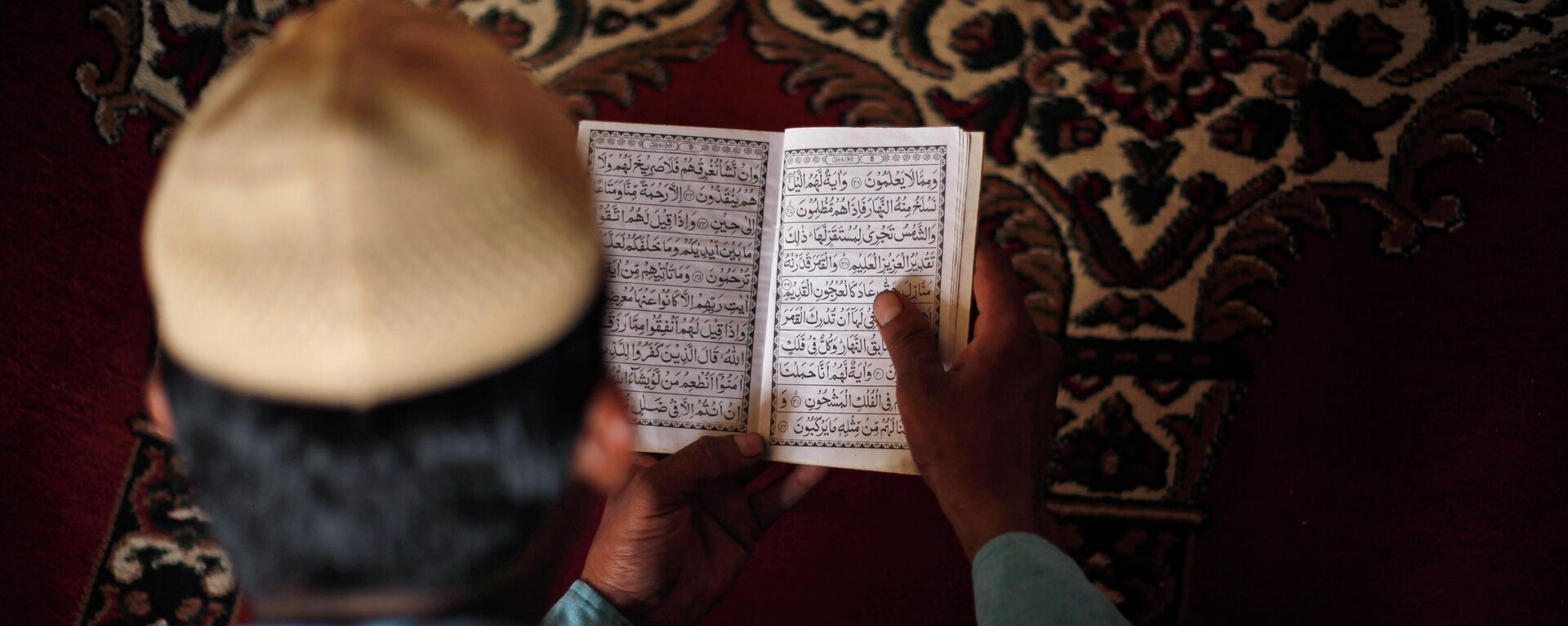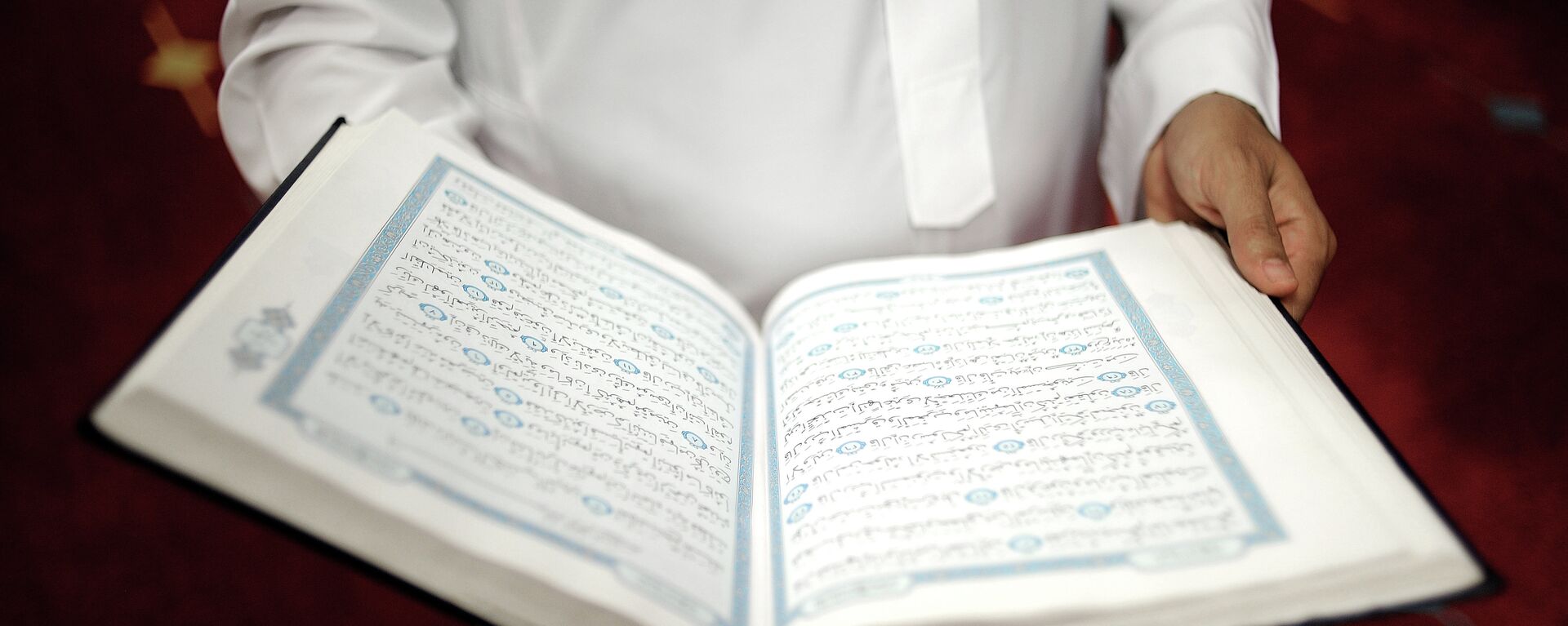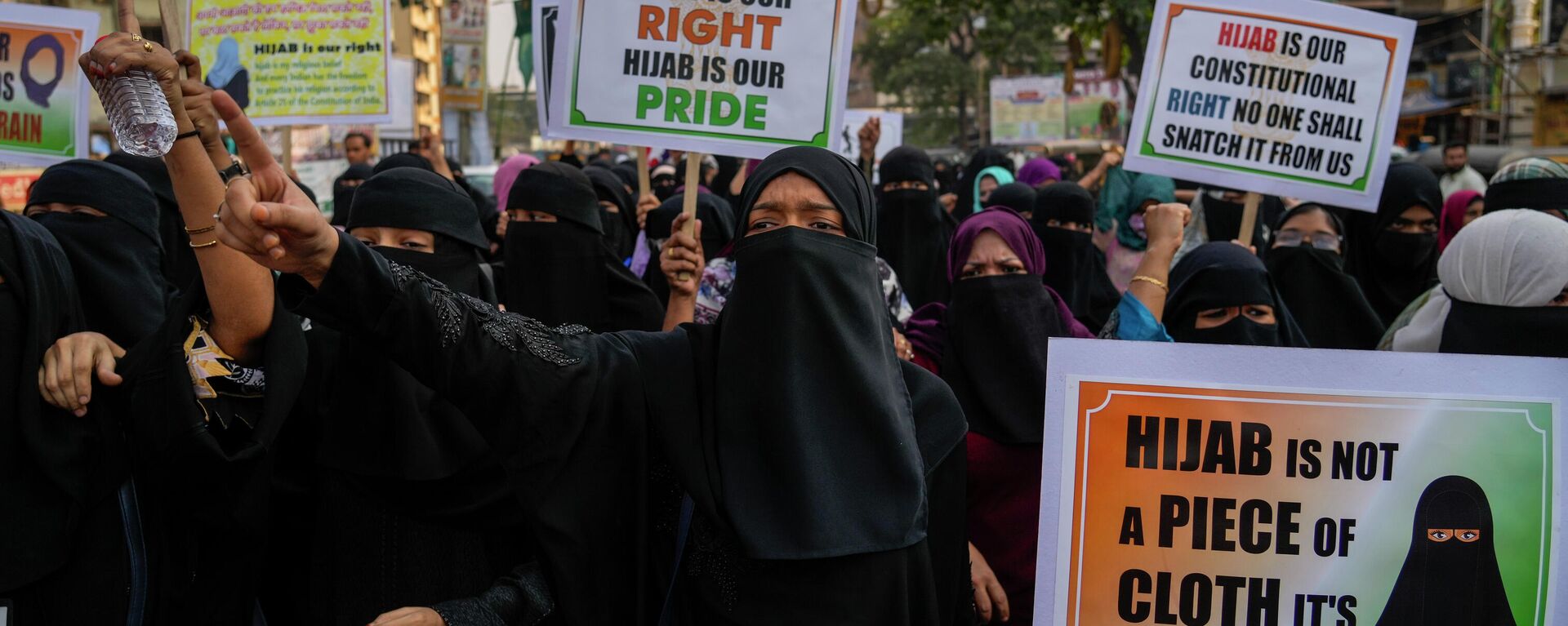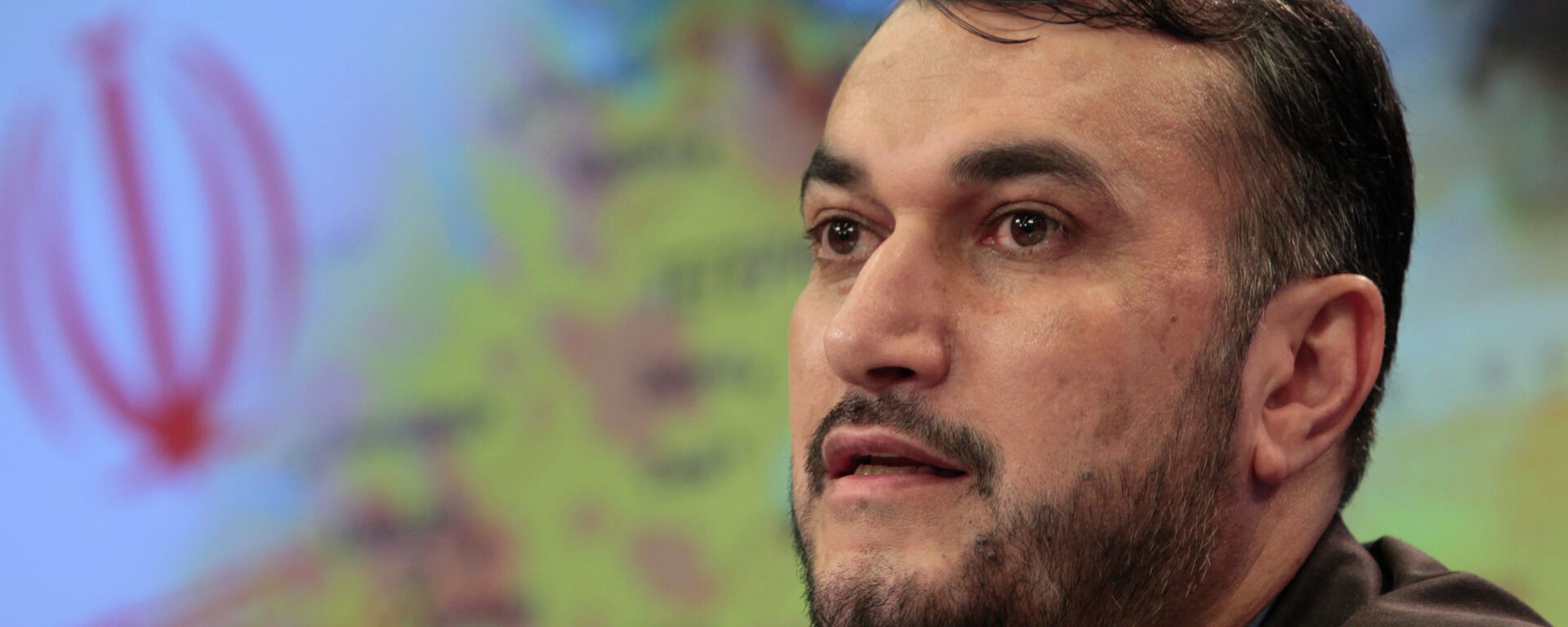https://sputnikglobe.com/20220610/era-of-impunity-is-over-why-is-india-facing-the-heat-of-islamic-nations-1096180755.html
'Era of Impunity is Over': Why is India Facing the Heat of Islamic Nations?
'Era of Impunity is Over': Why is India Facing the Heat of Islamic Nations?
Sputnik International
Demonstrators led by hardliner Pakistani group Jamaat-e-Islami (JeI) on Friday organised a march to the Indian High Commission in Islamabad to protest... 10.06.2022, Sputnik International
2022-06-10T11:46+0000
2022-06-10T11:46+0000
2022-10-19T20:36+0000
iran
saudi arabia
prophet muhammad
bharatiya janata party (bjp)
muslim
hindus
qatar
https://cdn1.img.sputnikglobe.com/img/07e6/06/0a/1096188776_0:0:3073:1728_1920x0_80_0_0_450996a2adefc8e2dad78ff6eb7985d5.jpg
New Delhi has gone into “damage control” mode as the diplomatic fallout over incendiary remarks against the Prophet Muhammad by a now-expelled Bharatiya Janata Party (BJP) spokesperson continued to dominate its foreign policy discourse in the wake of around 15 Islamic nations protesting the controversial statements.Bagchi also informed reporters that an Iranian press release giving an account of the meeting between Foreign Minister Hossein Amir-Abdollahian and Indian National Security Adviser (NSA) Ajit Doval on 8 June had been “pulled down”.Iran was among several Islamic nations which summoned the Indian ambassador this week over Sharma’s remarks.The Iranian release quoted Doval as assuring the visiting Iranian minister that the offenders would be dealt with in a way so that it creates an “example” for others.The Indian Foreign Ministry spokesperson further said that the row over remarks on the Prophet Muhammad and the Quran wasn't brought up during discussions between Indian Foreign Minister S. Jaishankar and his Iranian counterpart Amir-Abdollahian.Diplomatic Row is an ‘Alarm Bell’ for India, Says Ex-EnvoyTalmiz Ahmad, India’s former ambassador to Saudi Arabia, Oman, and the United Arab Emirates (UAE), has told Sputnik that the diplomatic row sparked by Sharma’s remarks should be an “alarm bell” for New Delhi as far as the treatment of its own Muslim population is concerned.He reckons that mistreatment or targeting of Muslims has been on the rise in the last few years since the Hindu nationalist Bharatiya Janata Party (BJP) first came to power in 2014.Ahmad underlines that the prophet is the “most revered persona” in the Islamic world, including among Indian Muslims.“Until now, most of the Islamic countries remained silent. They don’t like passing comments on the internal affairs of other countries”, the ex-diplomat notes.Indian Government's Attitude Towards MuslimsSeveral Indian Muslim groups and the opposition parties have expressed concerns over alleged discrimination against Muslims in India under Prime Minister Narendra Modi’s government.PM Modi, however, has maintained all along that he works for the welfare of all Indians, irrespective of their religion.A section of the Modi government's critics views Sharma’s remarks as part of the BJP’s overall politics and not an “isolated incident”.For instance, the Modi government’s Citizenship Amendment Act (CAA), passed by parliament in 2019, seeks to fast-track citizenship applications for persecuted non-Muslim minorities from Bangladesh, Pakistan, and Afghanistan. The new law has led to protests by Muslim groups across India and even led to the deadly riots in the Indian capital in February 2020.The BJP state government in Uttar Pradesh passed an anti-conversion law in 2020, which makes it difficult for people from different faiths to get married, and makes religious conversion from Hinduism complicated.The southern state of Karnataka this year ordered that hijabs be banned at pre-university institutions, which led to protests by Muslim students and community organisations.Besides, non-government actors such as Hindu hardliner groups have on regular occasions been accused by Muslims of trying to “vitiate” the religious harmony through provocative statements. A Hindu activist this year called for a “genocide” of Muslims, a statement that sparked international furore.What’s different this time around, however, is the strong reaction from Muslim countries towards the Hindu nationalist political agenda endorsed by a section of India's political leadership.Why Are India’s Ties with the Gulf Countries Important?For Ahmad, the most crucial aspect of ties between India and the six member states of the Gulf Cooperation Council (GCC) — Saudi Arabia, Kuwait, Bahrain, Qatar, the United Arab Emirates (UAE), and Oman — is the presence of a large Indian diaspora in these nations.“Indians have been viewed as apolitical, multicultural as well as a disciplined work force. They have been favoured by employers across the Gulf, including Saudi Arabia, Kuwait, Oman and Qatar”, he says.“Now, a sense could be created that certain Indians could be zealots”, Ahmad reckons.Ahmad further suggests that the energy relationship between India and the Middle East’s Sunni monarchies could “endure for decades” to comeAccording to the Indian government, more than 40 percent of its crude imports are sourced from Saudi Arabia, the UAE, and Iraq. Qatar, on the other hand, is the biggest supplier of natural gas to India and has also committed billions of dollars in investment in developing infrastructure in the South Asian nation.As far as Iran is concerned, Ahmad expects the country to play a crucial role in New Delhi’s connectivity initiatives, particularly the Port of Chabahar, which New Delhi sees as a gateway to the markets of Afghanistan, Central Asia, and beyond.How Has the BJP Reacted to the Diplomatic Row?The BJP suspended Sharma and expelled Jindal from the party after the diplomatic row broke out. In a statement on 5 June, the BJP's General Secretary Arun Singh said that the party was "strongly against any ideology which insults or demeans any sect or religion".In another corrective measure taken by the BJP, it reportedly identified 38 politicians who might have offended the sensitivities of Muslims because of their comments. At least 27 of them have been given an official warning by the party leadership, Hindi daily Dainik Bhaskar reported this week.Indian Commerce Minister Piyush Goyal has assured the public that Sharma's controversial statements didn't affect New Delhi's ties with Islamic nations.
https://sputnikglobe.com/20220606/gulf-nations-summon-indias-envoys-as-massive-outrage-erupts-over-alleged-anti-islam-remarks-1096041047.html
https://sputnikglobe.com/20220529/indian-muslim-groups-call-for-arrest-of-bjp-spokesperson-for-insulting-the-prophet-in-tv-debate-1095856559.html
https://sputnikglobe.com/20220309/hijab-row-tension-in-indias-karnataka-after-student-shares-pakistani-flag-on-whatsapp-group-1093715225.html
https://sputnikglobe.com/20220608/iran-seeks-indias-assurance-on-respecting-muslim-sensitivities-during-strategic-talks-in-delhi-1096128847.html
iran
saudi arabia
qatar
Sputnik International
feedback@sputniknews.com
+74956456601
MIA „Rosiya Segodnya“
2022
News
en_EN
Sputnik International
feedback@sputniknews.com
+74956456601
MIA „Rosiya Segodnya“
Sputnik International
feedback@sputniknews.com
+74956456601
MIA „Rosiya Segodnya“
iran, saudi arabia, prophet muhammad, bharatiya janata party (bjp), muslim, hindus, qatar
iran, saudi arabia, prophet muhammad, bharatiya janata party (bjp), muslim, hindus, qatar
'Era of Impunity is Over': Why is India Facing the Heat of Islamic Nations?
11:46 GMT 10.06.2022 (Updated: 20:36 GMT 19.10.2022) Demonstrators led by hardliner Pakistani group Jamaat-e-Islami (JeI) on Friday organised a march to the Indian High Commission in Islamabad to protest controversial remarks against the Prophet Muhammad made by an ex-BJP spokesperson. Meanwhile, Muslims also protested across India after Friday prayers.
New Delhi has gone into “
damage control” mode as the diplomatic fallout over incendiary remarks against the Prophet Muhammad by a now-expelled Bharatiya Janata Party (BJP) spokesperson continued to dominate its foreign policy discourse in the wake of around 15 Islamic nations protesting the controversial statements.
Indian Foreign Ministry spokesperson Arindam Bagchi reiterated New Delhi’s official stance at a weekly media briefing on Thursday, the first since the diplomatic row broke out, that the comments by now-suspended BJP spokesperson Nupur Sharma “do not reflect the views of the (Indian Government)”.
Bagchi also informed reporters that an Iranian press release giving an account of the meeting between Foreign Minister Hossein Amir-Abdollahian and Indian National Security Adviser (NSA) Ajit Doval on 8 June had been “pulled down”.
Iran was among several Islamic nations which summoned the Indian ambassador this week over Sharma’s remarks.
The Iranian release quoted
Doval as assuring the visiting Iranian minister that the offenders would be dealt with in a way so that it creates an “example” for others.
The Indian Foreign Ministry spokesperson further said that the row over remarks on the Prophet Muhammad and the Quran wasn't brought up during discussions between Indian Foreign Minister S. Jaishankar and his Iranian counterpart Amir-Abdollahian.
Diplomatic Row is an ‘Alarm Bell’ for India, Says Ex-Envoy
Talmiz Ahmad, India’s former ambassador to Saudi Arabia, Oman, and the United Arab Emirates (UAE), has told Sputnik that the diplomatic row sparked by Sharma’s remarks should be an “alarm bell” for New Delhi as far as the treatment of its own Muslim population is concerned.
“The communal discourse taking place within the country has started to affect the national interest. It is an alarm bell that has been sounded and we will do well to heed it”, Ahmad says.
He reckons that mistreatment or targeting of Muslims has been on the rise in the last few years since the Hindu nationalist Bharatiya Janata Party (BJP) first came to power in 2014.
Ahmad underlines that the prophet is the “most revered persona” in the Islamic world, including among Indian Muslims.
“Until now, most of the Islamic countries remained silent. They don’t like passing comments on the internal affairs of other countries”, the ex-diplomat notes.
“But a negative reference to the Holy Prophet is the red line”, adds Ahmad, who has also authored the new book "West Asia at War: Repression, Resistance and Great Power Game", published by HarperCollins. “It is a very serious crisis. The era of impunity is over”, Ahmad argues.
Indian Government's Attitude Towards Muslims
Several Indian Muslim groups and the opposition parties have expressed concerns over alleged discrimination against Muslims in India under Prime Minister Narendra Modi’s government.
PM Modi, however, has maintained all along that he works for the welfare of all Indians, irrespective of their religion.
A section of the Modi government's critics views Sharma’s remarks as part of the
BJP’s overall politics and not an “isolated incident”.
"Mrs Nupur Sharma and Mr Naveen Kumar (Jindal - another BJP spokesperson expelled for an anti-Islam tweet) were not the original creators of the Islamophobia. Remember, they were trying to be more loyal than the king. Domestic criticism did not impel the BJP to act against the two spokespersons. It was only the international backlash that pushed the BJP to take action", former Indian Home Minister and senior Congress Party leader P. Chidambaram said.
For instance, the Modi government’s Citizenship Amendment Act (CAA), passed by parliament in 2019, seeks to fast-track citizenship applications for persecuted non-Muslim minorities from Bangladesh, Pakistan, and Afghanistan.
The new law has led to protests by Muslim groups across India and even led to the deadly riots in the Indian capital in February 2020.
The BJP state government in Uttar Pradesh passed an anti-conversion law in 2020, which makes it difficult for people from different faiths to get married, and makes religious conversion from Hinduism complicated.
The southern state of Karnataka this year ordered that hijabs be banned at pre-university institutions, which led to protests by Muslim students and community organisations.
Besides, non-government actors such as Hindu hardliner groups have on regular occasions been accused by Muslims of trying to “vitiate” the religious harmony through provocative statements.
A Hindu activist this year called for a “genocide” of Muslims, a statement that sparked international furore.
What’s different this time around, however, is the strong reaction from Muslim countries towards the Hindu nationalist political agenda endorsed by a section of India's political leadership.
Former Ambassador to Saudi Arabia Ahmad says that the “time has come for our leadership to look at how we manage things at home and what implications these things have for our relationship with the Islamic world”.
Why Are India’s Ties with the Gulf Countries Important?
For Ahmad, the most
crucial aspect of ties between India and the six member states of the Gulf Cooperation Council (GCC) — Saudi Arabia, Kuwait, Bahrain, Qatar, the United Arab Emirates (UAE), and Oman — is the presence of a large Indian diaspora in these nations.
“There are around eight million Indians in these countries, with around three million in Saudi Arabia alone. The annual remittances they send back to India are to the tune of $35 billion, which is nearly a third of New Delhi’s annual crude import bill”, Ahmad explains, citing official figures.
“Indians have been viewed as apolitical, multicultural as well as a disciplined work force. They have been favoured by employers across the Gulf, including Saudi Arabia, Kuwait, Oman and Qatar”, he says.
“Now, a sense could be created that certain Indians could be zealots”, Ahmad reckons.
“So, the implications for the Indian workforce in the Gulf from the communal discourse at home is the biggest concern for New Delhi”, the former ambassador adds.
Ahmad further suggests that the energy relationship between India and the Middle East’s Sunni monarchies could “endure for decades” to come
According to the Indian government, more than 40 percent of its crude imports are sourced from Saudi Arabia, the UAE, and Iraq. Qatar, on the other hand, is the biggest supplier of natural gas to India and has also committed billions of dollars in investment in developing infrastructure in the South Asian nation.
As far as Iran is concerned, Ahmad expects the country to play a crucial role in New Delhi’s connectivity initiatives, particularly the Port of Chabahar, which New Delhi sees as a gateway to the markets of Afghanistan, Central Asia, and beyond.
How Has the BJP Reacted to the Diplomatic Row?
The BJP suspended Sharma and expelled Jindal from the party after the diplomatic row broke out.
In a statement on 5 June, the BJP's General Secretary Arun Singh said that the party was "strongly against any ideology which insults or demeans any sect or religion".
"The BJP does not promote such people or philosophy", the statement read.
In another corrective measure taken by the BJP, it reportedly identified 38 politicians who might have offended the sensitivities of Muslims because of their comments. At least 27 of them have been given an official warning by the party leadership, Hindi daily Dainik Bhaskar reported this week.
Indian Commerce Minister Piyush Goyal has assured the public that Sharma's controversial statements didn't affect New Delhi's ties with Islamic nations.
"All Indians living in Gulf countries are safe and they do not have to worry. There is no tension anywhere. I don't think this was a statement made by any government functionary. Therefore, it has no impact on the government", Goyal stated in response to concerns over the welfare of the Indian diaspora in the Middle East in the wake of Sharma's remarks.
